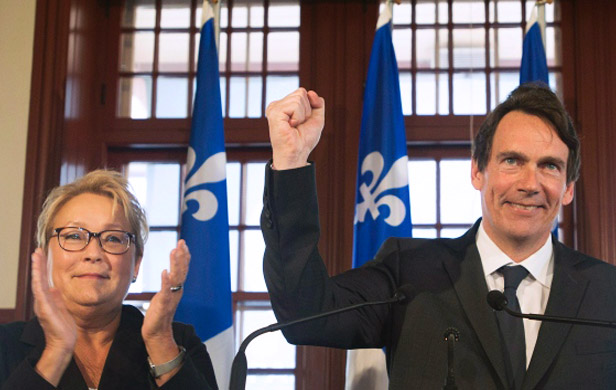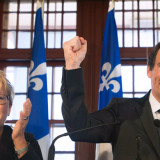
It is not unusual to hear and read about Québécois saying they don’t like any of the four options offered in this election. What is often referred to as mudslinging/insults – between Philippe Couillard of the Liberals (PLQ); Pauline Marois of the Parti Québécois (PQ); and François Legault of the Coalition avenir Québec (CAQ) – has become the main focus on this election campaign. To her credit, Françoise David of Québec Solidaire (QS) has managed to stay away from the mud.
[quote]Sadly, in this election, there isn’t any party proposing a road map for a prosperous, inclusive and green Quebec.[/quote]
What happened to the issues people care about?
Two leaders’ debates failed to rise above the mudslinging and the all-important issue of health was treated as an organizational or structural challenge.
Worse, the environment is one of the forgotten issues for the 3 main parties.
Only 4% of Québécois consider the Charter of secular values a priority issue, but the Charter has been and continues to be central to the campaign of the PQ, and by ricochet, for the other parties as well.
In the midst of all this, Philippe Couillard is trying to distract attention from the PLQ’s record of corruption and their weak platform by saying that Pauline Marois, if elected, plans on holding a referendum – which two thirds of Québécois don’t want – during her next mandate. Pauline Marois’s reply is that there will be no referendum until such time as the Québécois are ready, thus providing herself with very elastic time lines.
Sadly, in this election, there isn’t any party proposing a road map for a prosperous, inclusive and green Quebec. Many Québecois, federalists and independentistes alike – and myself included – feel like orphans in this campaign. In effect, a recent poll gave low marks on “integrity” to all four leaders.
Environment takes back seat to resource economy
For his part, Philippe Couillard’s vision for the economy is a re-run of an old Jean Charest movie to the effect that Quebec will generate much of its new wealth from the mining and export of raw natural resources from northern Quebec – the old economy tunnel vision.
The environment doesn’t even rank as an important election issue for Couillard.
Indeed, Couillard omitted the environment from the moment he submitted his vision as a candidate for the leadership of the Liberals. For the 2014 election campaign, continuing along the same lines, other than rhetorical messages that resource development practices would respect the environment, the environment gets little to no attention from Couillard – not all that different from Stephen Harper in this regard.
In replaying Jean Charest’s “Plan nord” to pour government money into infrastructure for developing northern resources, Philippe Couillard has simply added a few bells and whistles for a “new and improved” plan.
For its part, the PQ is equally focussed on a resource economy – the economy of the past – and has its own version of a nebulous Plan nord which it pairs with lottery-like, high-risk government investments in shares of shale oil activities for Anticosti Island in the Gulf of the St-Laurent (St-Lawrence River).
The reality is that the UN Conference on Trade and Development has indicated that resource economies are formulae for trade deficits because the price of raw resource exports relative to high-tech manufactured goods has been falling for more than a century.
I am not sure what planet Couillard and Marois live on, but they seem to have not noticed that China, the EU, and even the US, are well-engaged in the emerging global green economy. In effect, the green sectors are now among the highest job creation sectors of our times. There are currently 3.5M jobs in the EU green sectors, 1.2M jobs in EU renewables and the German green sectors employ more people than the German auto sector.
To be fair, however, Marois, while favouring investing government money in shale oil exploration on Anticosti Island, also claims to be interested in promoting a green economy. Against the backdrop of Quebec’s emerging electric vehicle industrial base – which includes manufacturers and developers of batteries; electric motor wheels; urban and intercity electric buses; and charging stations – the PQ platform proposes $517M over 4 years for the electrification of transport. But in the final analysis, this is a small sum of money that won’t go very far in supporting the electric vehicle sector in Quebec when spread out for charging stations, vehicle rebates, subway and commuter extensions, leaving little for supporting innovation and the development of a local industry.
In any case, it’s hard to say where all the money for Marois’ many electoral promises will come from because Quebec is broke – the cupboard is bare.
Pierre Karl Péladeau and the Charter of Secular Values
Not to be outdone by the Liberal nonsense, the PQ, to make itself attractive to nationalist right wing voters, has offered us its anti-Muslim secular Charter; its draconian greed representative, Pierre Karl Péladeau; and, the icing on the cake, its hysterical, anti-anglo, paranoiac outburst on the invasion by Ontario anglos of Montreal voters’ lists (where there are 2 English, as well as two French, universities).
If one believes the PQ, a miniscule percentage of anglos and non-Christians wearing religious symbols are to blame for Québec’s incapacity to realize its “noble” identity.
The Charter’s purpose is supposedly to promote the equality of the sexes and the neutrality of state by eliminating the wearing of religious symbols by public sector employees – because these symbols are associated with the inferiorization of women and the undermining of government neutrality. Trouble is that the equality of the sexes exists in places like BC and California and the neutrality of their respective state institutions is not undermined by having a female doctor with a headscarf treat a patient.
The Charter is, in effect, political theatre for the purposes of cultivating a sense of fear, while exploiting ignorance of the other/unknown, in the regions of Quebec which have little to no multicultural presence.
On March 31st, in a seemingly desperate attempt to head off criticism regarding years of judicial battles that would follow the adoption of the Charter, Pauline Marois spoke of using the “notwithstanding clause” to permit exemptions from the Quebec and federal charters of rights and freedoms. In reality, in the event of the adoption of the Charter as proposed by the PQ, one should still expect legal battles that go on for years, plus generalized civil disobedience in the greater Montreal area – which represents half of the population of Quebec.
Does Marois plan on building lots of prisons for this battle?
CAQ and QS: The other parties
The CAQ is a Quebec version of the Conservative Party of Canada (CPC), with its plan to reduce the size of government and offer a $1000 reduction in personal taxes. This CAQ/CPC formula would not only result in a deterioration of government services, it would also lead to greater deficits and consequently further justification for cuts – a vicious circle.
Meanwhile, the QS is focussed on the re-distribution of the wealth and a green Quebec but doesn’t seem to have any interest in, or knowledge about, creating wealth and developing a green economy. QS doesn’t even appear to be aware of the relationship between the green economy and job creation.
Also, as amazing as it may seem, QS is so disconnected that it is unaware that a green economy is as diversified as a resource-based economy and includes nearly every economic sector. Consequently, when the QS says it will finance going green by redistributing the wealth to invest in public transportation for all parts of Quebec, it reflects how naive or inept is the QS.
By way of magic, the QS’ fluffy platform for a green and equitable Quebec suggests these goals require an independent Quebec. With only 9-10% of the vote in Quebec, it may be argued that the QS stands a better chance of realizing its re-distribution of wealth and green objectives by joining with progressives from the rest of Canada.
Moreover, addressing the green economy challenges is like addressing the challenges of poverty and as such does not lend itself to the short wish list of QS generalities. Rather, a holistic approach is required so that a wide range of measures can converge in a synergistic manner to produce transformative change. A combination of fiscal and legislative initiatives, policies, programs and projects, incentives/disincentives and other related measures are essential for a successful migration to a green economy.
Four bad choices
In the final analysis, for progressives with their feet on the ground, all four parties are unattractive.
As for which party is more corrupt or deficient in integrity – the PLQ or PQ – under the circumstances, it doesn’t really matter. Unless, of course, one feels the choice boils down to a corrupt federalist party versus a corrupt “independantiste” party.
Accordingly, whatever the results on April 7th, a word of caution about the pundits’ explanations of the results: don’t buy any of it. Too many will not have voted for something they want.
While Tom Mulcair has made some hints about the creation of a provincial NDP party in Quebec,for those wanting an option offering a path to a prosperous, inclusive and green economy, there isn’t anything available for April 7, 2014.


Really “there isn’t anything available for April 7, 2014”.. I know of 44 available candidates of the Parti vert du Québec. Perhaps one needs to read French to know. The eco-socialist option for Québec!